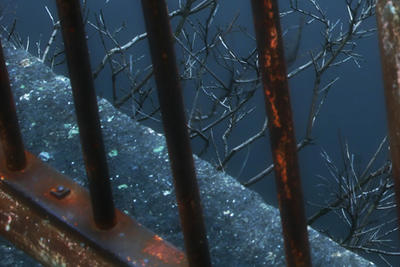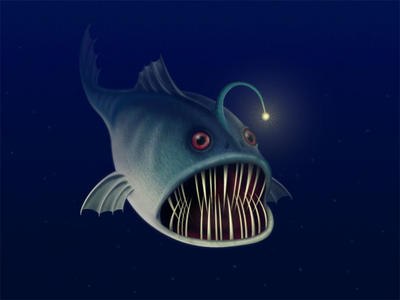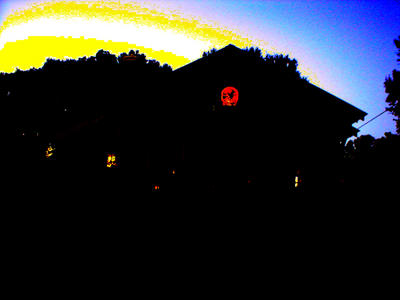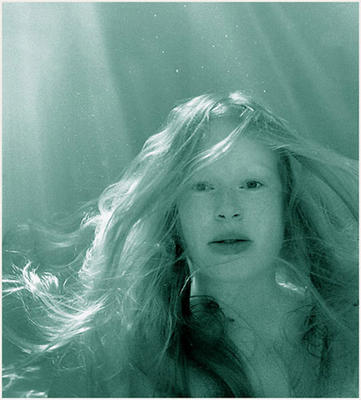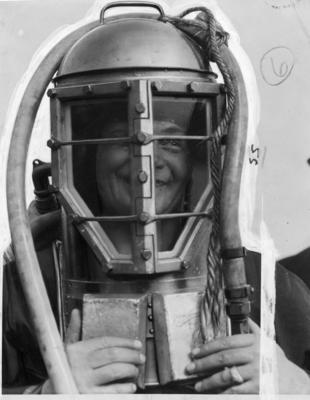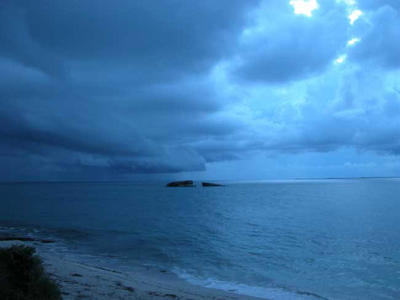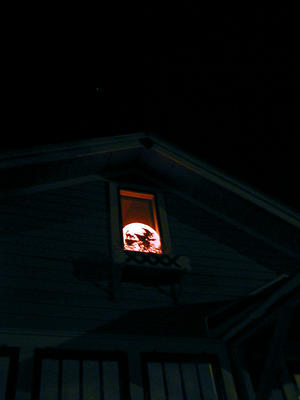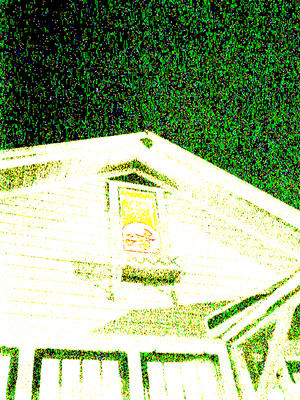A Skull Miscellany (2)
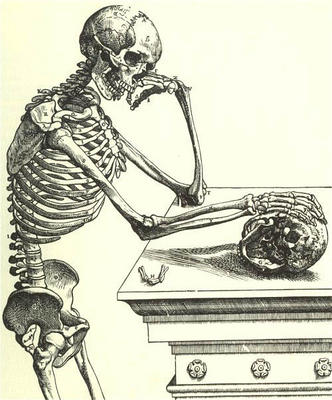
Happy St. Oran’s Eve, patron saint of Halloween! Time here to celebrate his bones which relic in our own stone bone, basalt cave of beginings, shore of shattered cliffs, dragon back of wild Upffington, henge of every stiffie shaken at the sky, Eros and Thanatos coiled round his head stone, floor and door, dark fire haloing every harvest moon.
Yes, celebrate ... go trickertreating, exhume Yorkick monstrous jest, shoe the dragon and saddle Leviathan, roger and romp and jolly rumpus this pale imitative world: A bit of banshee shriek and trooping Sidhe, singing Oran’s birthday song!
***
HALLOWEEN
1996
The jack-o-lanterns glow on porches down the street
with flickering grins of flame: burning on this night
the ancient ruse of fancied horror. On TV the rictus
legion of slashers and vampires sleuth their victims
smooth and caressingly as the blood silk lining
of a cape. It's for the kids, we say, stocking
our plastic pumpkin with candy to the brim:
but we'll eat all the kids don't, and scare ourselves most: It's our treat.
Such pleasures still haunt this creaky boneyard night.
Alas for those poor Christians, who sulk the sidelines
decrying all this as Satan's dance, or stage their own
haunted houses as a bit of real hell. Tape recorded moans
of the unconfessed dead crowd the dark front room, where
a carpet salesman cloaked as a demon tries to scare
pimply pubescents into the folds of the Everlasting Hope Church.
The kids are willing victims, the easiest marks for a lurch.
He leads them through ever darker chambers of sin:
he sighs for the blackened soul of an AIDS victim
dying of alternative lifestyle; gloats over the wet plop
of an aborted fetus in a butcher's room (would have grown up
to be a preacher, he jeers); applauds the twisted carnage
of a drunk driver's dance with a wall. Finally, in the darkest
deepest reddest room that reeks of smoking limburger, mark
how all seems lost -- but then the lights come up
and a janitor dressed as sweet Jesus appears to all, to cup
salvation over all who kneel. Salvation from what, I wonder,
as I look out this window at some kids racing in sugar thunder
up to our house, and pray that the mute misery of our jack
-o-lantern spread crooked and lavish its flaming rack
of teeth: trick us or treat us, but let the night squeal,
and good heavens please spare us from the jaws of the real.
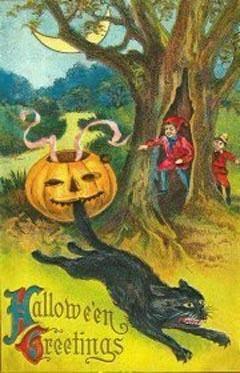
THE UFFINGTON HORSE
2003
The locals say I am the beast
St. George slew, his white sword nailing
The heart of this hill. Well, time weaves
Tales around the hearts of men, but
I am no altar to the need
To kill the winged insides of
Every kiss. Recall how kings of
Old were taken up the hill to
Mount a pure white mare, his flesh in
Hers turned sceptre beneath the white
Applause of stars. I Rhiannon
Ride this high ground like the crest of
The ninth wave. My saddle is a
High hard throne -- mount me, if you dare.
Plunge your song in salt everywhere.
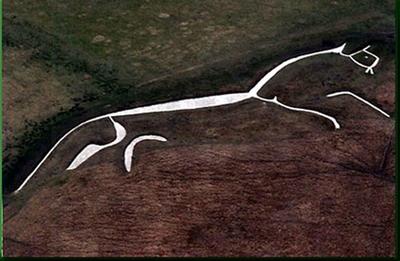
BONING THE GHOUL
2002
An appalling sweetness
slipped into view
when I lost the last
wet curvature of you:
Well, “lost” is landfill
for all tossed verbs,
numens of that last kiss
trucked from dead suburbs.
Atop that dread mound
an eerie twattage glows
as ghoul cockage choirs
in solemn, bony rows.
That chorus sings to me
the beat-to-hell old news
that I’ll not find her again
not even in rear views.
Who knows why forsaking
me was for her so easy,
why she drained the glass;
Or why her sleazy
voidings like a vacuum
in me yet clench,
a vertigo in all makings
with a familiar stench,
deigned to rule a wold
of cold and moony nights
with thorn plecturings of
strings no longer white,
their amperage sucked dry.
What’s horniness if it
douses not in fire
but bone-dry recit,
unbuttoning not blouses
but stone lips of banshee
rue—burning wicker men
because some dame decreed
my hands anon away?
Who wants to fornicate
unnippled sprites of ire?
Let’s banish hope, excoriate
the lust: debone the ghoul
who haunts the ossuary
of every stiffie lost:
let’s remit the actuary
before tits up it tanks.
She rose up from a wave
of breaking blue joy;
and then without a wave
she disappeared, willing me
this stale and sour undertow.
I’ll not find her on this
beach again: It’s time go:
Time to rearrange
into less salty, surer show:
time for bright diurnals
where fresher boners grow
beneath the fertile loam
of an untroubled sleep.
I’ll plunge on alone now
on waters twice as deep,
ghost-captain of a boat
destined for dryer shores,
calmer nights, no matter
how she always gores.

My recent reading of Erich Neumann’s The Origins and History of Consciousnes found a booming welcome to something that was slowly coming to my awareness. Makes sense than when humans were less conscious, the dark was a much greater feared presence. All that old moon magick and superstition and rituals of exorcism: the conscious flame was a flickering one indeed. But now, seems like we can’t shut the big light off, it just whirls around and around and around, like a lighthouse beacon, nailing everything in its gaze. We are conscious to a fault, light is the new abyss, our synapses jammed in the “on” position.
So when I try to get at the dark sides of things, I don’t mean I’m playing with evil or invoking dread states, but rather that the compensation of this day has to work the other way, flow back towards the heart (as you suggested early on). A conscious dimming, perhaps. With such heightened abilities of the conscious mind (I may be massively fooling myself here), we should be able to return to those dark origins not out of fear but with a sense of trying to partner with the preconscious and preterconscious mind, the instinctual animal who is also our greater angel. (Remember Merlin was the child of the union of a hairy imp and wondrous maid).
Is there a way to ride the sexual as a sort of sea-horse or dragon of great power, turning its infernal procreative appetite toward creative production? Are we growed up enough to risk stepping on for such a ride? I suspect that energy runs like a ley-line back to the Fisher King’s castle, runs right under him, back to the room in which the Grail is keptl, under the terribly old figure who sleeps there — all retired gods, perhaps — back through the other rooms, neolithic and paleolithic, Neanderthal, all of the simian figures, all of the warm-blooded familiars, thence back to the cold-blooded ones, vertebrates, invertebrates, hundreds of millions of years, back through organic to the inorganic, the dominion of stone, of star. What a wild ride that dark energy provides, as long as we understand that we can never master it, never own it, never put it to selfish uses — all of those foibles of the Errant Knight who forgets the difference between Noble and Gluttonous Heart.
Thanatos, perhaps teaches Eros that difference ...
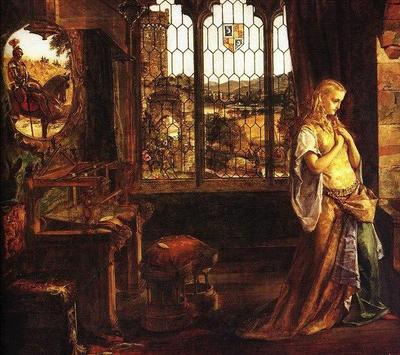
THE DEAD
Eugenio Montale
transl. Jonathan Galassi
The sea that founders on the other shore
sends up a cloud that foams until
the flats reabsorb it. There one day
onto the iron coast we heaved
our hope, more frantic than the ocean
-- and the barren abyss turns green as in the days
that saw us aong the living.
Now the north wind has calmed the muddied knot
of brackish currents and rerouted them
to where they started, someone hangs out nets
on the pruned branches --
faded nets that trail
onto the path that sinks from sight
and dry in the late, cold
torch of the light; and over them
the dense blue crystal blinks
and plunges to a curve of flayed
horizon.
More than seaweed sucked
into the seething being revealed to us, our life
is rousing from such torpor;
the part of us that stalled one day
resigned to limits, rages; the heart flails
in the lines binding one branch
to another, like the water hen
bagged in the meshes;
and a cold deadlock holds us
static and drifting .
So too, perhaps
the dead are denied all rest in the soil:
a power more ruthless than life itself
pulls them away and, all around,
drives them to these beaches,
shades gnawed by human memory,
breaths without body or voice
expelled from the dark;
and their broken flights,
still barely shorn from us, gaze up
and in the sieve of the sea they drown ...

There is, one knows not what sweet mystery about this sea, whose gently awful stirrings seem to speak of some hidden soul beneath; like those fabled undulations of the Ephesian sod over the buried Evangelist St. John. And meet it is, that over these sea-pastures, wide-rolling watery prairies and potters’ fields of all four continents, the waves should rise and fall, and ebb and flow unceasingly; for here, millions of mixed shades and shadows, drowned dreams, somnamulisms, reveries; all that we call lives and souls, lie dreaming, dreaming, still; tossing like slumberers in their beds; the ever-rolling waves but made so by their restlessness.
-- Melville, Moby Dick
***
Very early in Irish tradition a story already existed about the resuscitation of a dead giant which contained the following elements:
1. The saints and his companions come across a grave of extraordinary size, or ... the head of a dead person.
2. The saint's companions utter the wish for the buried person to be alive, either because they are eager to meet such a huge person, or because he may be able to tell them about things from times gone by, or about "the invisible things."
3. The saint resuscitates the dead man or head.
4. The resuscitated person proves to be a giant or heathen.
5. He tells them that he suffers in hell, about the torments of hell, or about the place where he lives in hell.
6. He tells the story of his life and ancestry.
7. He is offered baptism, or begs to be baptised, in order not to have to return to hell. He is baptized, dies, and is buried again.
- Clara Strijbosch, "The Heathen Giant in the Voyage of St. Brendan" Celtica 23, 1999, p. 391
GHOULPLAST
March 2004
I found a skull in the
back yard, on the front
seat of a rusted-out
car sitting on blocks.
I once owned it, the
skull I mean, well
the car too, I wore
both out on the merry
marauding road of
guitars and bars
and tits in jars on
too-high shelves. I
found it there, the
skull I mean, while
I was looking for
another poem, rummaging
through fallen oak
leaves for a broken
snake, I mean its
tail cut off, chewed
off probably by one
of the cats. I’d found
it out there Saturday
as I worked in the
yard raking and mowing
on a hosanna of a
spring morning. Poor
snake, it was still
alive, crawling away
from my rake as I
probed the tiny grey
thing that was bigger
than a worm, almost
as round as the
buried cock of this
poem. I let it go
just then, reminding
myself to write a
poem about it when
I settled back here
in the court of
excavations
exhumations
& starry ululation.
So today I went
looking for that snake
in the back yard, on
this page I mean,
uncovering not a
half-chewed still-
plumbing umbilicus
to chthonic hoohah
but woeful relics
of a wild bad time
I though were well
buried, sobered up,
the major archons
of those nocturnal
motions bound at
the wing and tossed
down into this
purgatory of words.
I held my old skull
in my hands like
Hamlet graveside
of Ophelia his old
pal Yorick’s jester skull,
the noggin huge as
a Neanderthal, perhaps
as old too. He I
brooding on old
merriment, old loves,
old thrall. Gone.
I half-expected
that half-snake to
pounce up at me
from a black eyehole,
at least sigh within,
hiss. Nada. Instead
the wind cranked
up from offstage hands
to moan and whistle
through that rusted-
out ‘76 Datsun 710
I pushed to the side
of the road maybe
18 years ago,
giving up that bar-
car filled with
cigarette butts and
blackouts for good.
One night I fucked
a hot rock chick
in that now splayed
and ripped back seat,
my 6 foot 3 frame
somehow compressed
to four as I boiled
sperm in her thrusting
shouting beach-white
loins. Some scent
of her sex coiled
in the orange blossom-
fume sailing on breeze,
corrupt as booze
and twice as fragrant.
Gone, perhaps, or
soured into that
awfuller smell of
the 1000 other nights
I didn’t score the
hot rock chick,
the sweat and the
futile frenzy of
desire’s crucifix with
its immortally
immoral nails oozing
a pustulent nacre,
that awful smell
from when I crapped
my pants in a blackout
one night when some
of the bartenders at
the Station tried to
push my car up out
of the bushes behind
the bar. Soured in
graverot: almost gone.
I asked my hand, just what
do I do now? Preach
my gospel of blue
motions til the brutes
receive communion
and settle on back
down to dark-as-
sweet-oblivion ground?
I wish I could, but
I don't know words
blue enough to bless
the dead. Instead, I
call on Prosper’s shade
from the hour when
his tempest stilled --
fatherly at last of
foul Caliban when he
said, “this thing of darkness
I call my own.” Indeed.
And so I put lips to bone
and battered steel
and call their evening
home. Somewhere in
the leaves beneath the
oak, just beyond the
borders of our yard,
I hear a snaky shake and
coil, reminding me
to write of him another
day, to let my ghoulplast
hold the rake and
do some honest work.
Maybe then you’ll find
proper burial at last,
salt my seas but good
and buouy that dolphin
boy who guides my hand
along every graveside
stone along this Road
of Blue-Boned souls.
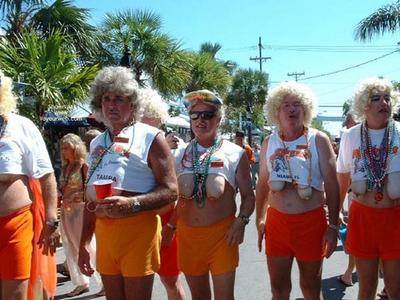
The Life of Colum Cille (Columba), written in Irish by Manus O'Donnell and written in 1532, contains the following episode:
"Once when Colum Cille was walking beside the river Boyne a human skull was brought to him. The size of the skull was much bigger than the skulls of the people of that time. Then his followers said to Colum Cille, "It is a pity we don't know whose skull this is, or the whereabouts of the soul that was in the body on which it was." Colum Cille answered, "I'm not leaving this place until I find this out from God for you."
"Then Colum Cille prayed earnestly to God for that to be revealed to him, and God heard that prayer so that the skull itself spoke to him. It said that it was the skull of Cormac mac Airt, son of Conn of the Hundred Battles, king of Ireland, and an ancester to himself, for Colum Cille was tenth generation after Cormac. And the skull said that although his faith wasn't perfect, he had a certain amount of faith and, because of his keeping the truth and that as God knew that from his descendants would come Colum Cille who would pray for his soul, He had not damned him permanently, although it was in severe pain that he awaited these prayers.
"Then Colum Cillle picked up the skull and washed it honorably, and baptized and blessed it; then he buried it. And Colum Cille did not leave that place until he had said 30 masses for the soul of Cormac. And at the last of the masses, the angels of God appeared to Colum Cille, taking Cormac's soul with them to enjoy eternal glory through the prayers of Colum Cille."
- O'Donnell, The Life of Colum Cillle, transl. B. Lacey, Dublin 1998
***
BIG SKULL
2002
There’s a big skull
in our back yard
satirizing the half
we vaunt as day.
I hear it droning
low old chants
& alms, sad &
deep within its
chapel bone, cold
as time and all
that drained away
while we built and
taught and moved
zand won. Our way
is powerful and
ripe, it’s true—a red
engine of high
rhythms, fleet
furious and blind.
It arcs a future
which has no need
of you and me;
it has cured itself
of the ache to love.
La la la, sings the skull
out back, not exactly
mocking, nor ironic,
but deeply disturbing
as all engraved
jesters are. He’s
exactly what we
cannot stand to hear:
correction from
down under,
God’s thunder
bringing up the rear.
From Jung’s Sermons to the Dead, IV:
The dead filled the place murmuring and said;
Tell us of gods and devils, accursed one!
The god-suun is the highest good, the devil its opposite.
Thus have ye two gods. But there are many high and good things
and many great evils. Among these are two god-devils; the one is the
Burning One , the other the Growing One.
The burning one is EROS, who hath the form of flame.
Flame giveth light because it consumeth.
The growing one is the TREE OF LIFE.. It buddeth,
as in growing it heapeth up living stuff.
Eros flameth up and dieth. But the tree of life groweth with slow
and constant increase through unmeasured time.
Good and evil are united in the flame.
Good and evil are united in the increase of the tree. In their divinity
stand life and love opposed.
Innumerable as the host of the stars is the number of gods and devils.
Each star is a god, and each space that a star filleth is a devil.
But the empty-fullness of the whole is the pleroma.
The operation of the whole is Abraxas, to whom only the
ineffective standeth opposed.
Four is the number of the principal gods, as four is the
number of the world`s measurements.
One is the beginning, the god-sun.
Two is Eros; for he bindeth twain together and outspreadeth himself
in brightness.
Three is the Tree of Life, for it filleth space with bodily forms.
Four is the devil, for he openeth all that is closed ...
SKULL O’ BLOOD
2003
O for a well-bucket
of living memory—
a rich, steaming
cup of blood
fresh as the night
I spilled it carousing
my way home
out of the usual
complications of
self and selfish
oblivions—
Blood in the
savagery of raw
nakedness when
my hand reached
clasped her breast
like the harbor
of a lost island—
Blood in cupping
squeezing &
nipple-pinching the
reality confined there,
getting past all
the staves and punji
sticks which provoke
and fend desire
(lonely, drunk,
shy, broke, speechless)—
Blood in breaching
the self’s prison walls
for a night on a
mermaid shore
misted with the
sea’s own noctilucent
billows.
I recall being 14
on a moonlit night
& sitting on a
parked motorbike
behind a neighborhood
girl & touching
a breast for the first time:
The wander up
under her t-shirt
with trembling hands
under bracups and
then boy-manning
that gelid flesh,
meeting no
resistance for a while:
scared shitless with
both hands on
her breasts while
she sat still and
patient for 30
seconds in that
moonlight til’,
deeming me milked,
shifted away off the
bike & leaving me
there trembling
and united with
those darker lower
regions I carried
like a a lake of
eternal joy:
Oooh rich skull
of my own blood,
bubbling for the
first time &
forever ripe
in the undying flavor
of desire and
fear and daring
which I suckled with
greedy teeth. Dip
your pen in that cup
if you dare, if
you still can, if
you can take
me back there
to stain my lips
with that greedy
hot & lost pulp.
DEMON IN THE WALL
2002
Engraved upon a basement
wall is a devil trapped in rope.
That’s how all churches, hooch-
stills, and marriages begin:
A raw, primordial age
when equal forces saw:
the good which would begin,
a dark which backwards falls.
There is a time when
principalities roar, the balance
terrible, a back-and-forth
over sweet prefecture and ruin;
the mouth which chants
the ululant vowel is also
filled with teeth, filed
to a glittering “T.”
There was a time not long ago
when love and its shade were split;
and on that tortured ground
all decency was spilt, sacrificed,
perhaps, so a carnal
knowing could evolve
from rough magic on to rue,
allowing it a dark enough depth
so I could know for sure
what going home meant.
A boy-man’s down there with
a snake gripped in his teeth;
I’m better off engraving him
lest sleep unloose the rope
and black wings again soar.
THE NEXT PASSION
March 2004
Journalists of soul,
please note: This week
“The Living Dead,” a
re-make of George
Romero’s ghoul opera,
has knocked Mel Gibson’s
“The Passion” from
the top of the box
office chart. Apparently
we eat our dead with
steadfast glee, and
don’t require a cross
nailed so to glut on
eviscerations of
the apparitional Sidhe:
Perhaps the thrall
parallels from viewing
chair to chair, the muse
of worst ends endless
in her gory repartee
onscreen or page or
down the stony circles
where our imagination
yet fumes. How ripe
she dances up there
on the screen, peeling
off her fancies behind
the next victim’s throat-
split scream. Something
of that horror is too
revenant to simply
die away: it keeps
on knocking at the
doors and window
of our age, polite for
now but persistent,
as thirsty for our blood
as we are for recalling
theirs. Counter-Janus,
the faces stare each
other down at this
threshold., imploring,
aroused, even greedy,
the appetites of life
and death far more
dangerous than “vital”
or “needy.” Here’s a
table that we keep
returning too until
we’ve “supped full
well with horrors,”
like Shakespeare’s
bloody knight, holding
court onscreen in
a blue-to-black Hell
Castle reflected from
our darker soul’s
incessant gleam,
devouring for two
hours and twenty two
minutes a persistent
love-sick night.
Black hooves indeed
hammer all the nails
securely in. It’s what
that God requests
on His on way back to Eden--
the next passionate
eviscerating sigh.
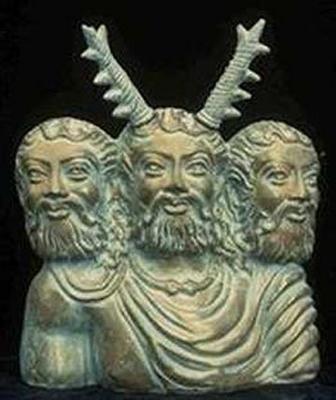
AZTEC KISS
2004
A relic of the Aztec
empire’s throne of blood
is on display now at
the Guggenheim — a skull
mask: Back half removed,
eyes fashioned from white
disks with huge black
balls for pupils and —
here’s the cruellest
part part — long
flint knives for nose
and tongue: Those
blades reveal that
age’s eyes were
insatiable for that
red syrup of the
heart: Thier great
gods thirsted
for it like drunks
their hooch:
They also spell
the spillage of
that age, for blood
that is priests
and kings in
gold sunlight
slipped and fell
hard on, all the way
down their pyramids
to doom: Ghastly for
sure but the mask
is vivid, wildly florid,
brilliant at the altar
of that devastating
sun: Knives for certain
are for noon, that sharp
stilled hour when lust
and greed shriek like
the sun-horse’s balls
and the distance between
serrated blade and
pulsing terrified heart
is but one tock
of plunge: Far indeed
such vicious tropes
from those we worship
in this age: Thank
God that sharp
relic’s glow is deep
in a museum’s vault:
Yet not so far perhaps
if that image still clicks
like a switchblade into
sudden truth, those
sensory blades leaping off
the page and all the way
to here: That skull mask
is always trooping through
the day with wide dead
eyes alert as Doom for
the next exposed pulse—
openings in traffic,
a sale ripe for the
plundering in a caller’s
wavering voice: Pangs
of hunger lifting in my
mind the top from
a microwaved tub of
Cuban rice and
beans and chunks of
pork awash in tomatoes
and cilantro: The steely
rage I feel when
I hear our reelected
bubbleboy of a President
on the radio when he
says the word mandate:
When movement in
the corner of my eye
sharpens as I look out
my window at work
into a pretty girl jogging
by, sweaty cleavage and
thumping butt is
suddenly speared by
a bolt of lust that
flings tipped with
that blade, pinning
her against a wall
& tearing shorts
& panties down and
thrusting balls to walls
that skull mask’s pierce
of all the world’s fishes
leaping there: Inside this
nice guy who’s near 50
who writes and rides
toward Love there’s
just below a demon rider
with brash obsidian
snout and tongue of
adder’s fire: The cold
front now slicing
down the state belongs
to him: So I suspect
do your eyes, my blue
Fomorian, and all
that ripens in your
bustier of ice: Every
beloved hoods a knife
inside her sighs which
will not settle for
anything less than the
real mortal bloody
beating deal till death’s
black wombage swells
past full: Every poem
has the slosh and pour
and is lyric as the moon
but understand there’s
a darker porpoise snout
below, chipped and
whetted long ago
to kiss every shore
and keep plunging
through, from well-
hung tongue to
hell’s own bung,
nailing and cleaving
the heart of every
next ripe heart of song.
ENTER THE DRAGON
2005
The Dark -- felt beautiful.
-- Emily Dickinson (Fr. 627)
Beware the scented bed of
Love: it rides upon the
dragon’s back who swims
abyssal realms. Drowse
there and you’ll wake
a molted man of fire,
enrapt inside the rupture
of the devil of deep
welcome. Your wings
will lift you into nights
the size of titan ire,
your eyes whet and keen
for any trace of blue
embroilment to fall,
silklike, from yet
knowable breasts
ripe and leaking
dragon’s milk, booze
poured from paps
of doom. Ride such
nights at your peril,
son of ancient smiles:
Do not presume you
have tooth or troth
sufficient for that dark
demanding angel ride
into the chasm which
splits the fundaments.
Just hold on for your
immortal soul
and let heavens collide
and smash down
every shore. Let every
numen reveal the bestial
depths below, like buoys
singing on blackened tides,
rippled by deep waves
fanning deeper lands
than undreamt Love can go.
When Pryderi returned ((to Dyfed)) he and Manawydan feasted and took their ease. They began the feast at Arberth, since that was the chief court where every celebration began, and after the evening’s first sitting, while the servants were eating, the four companions arose and went to Gorsedd Arberth ((a fairy mound)), taking company with them. As they were sitting on the mound they heard thunder, and with the loudness of the thunder a mist fell, so that no one could see his companions. When the mist lifted it was bright everywhere, and when they looked out at where they had once seen their flocks and herds and dwellings they now saw nothing, no animal, no smoke, no fire, no man, no dwelling — only the houses of the court empty, deserted, uninhabited, without man or beast in them; their own company was lost too, and they understood that only the four of them alone remained.
— “Manawydan son of Llyr,” from The Mabinogion, transl. Jeffrey Gantz
TOTAL ECLIPSE OF THE HARVEST MOON
St. Oran’s Day 2004
Last night the harvest moon
burnt full inside a total eclipse,
as if Saint Oran himself
bore on his feast night
the earth’s voyaging shade.
His boat indeed is dark
inside that pure silver,
mined from every
shores he searches within.
When I woke that harrowing
was over & the moon burnt
high above the west,
a white skull turning the
sky into wild milk, so hot
with noctilucence that it
almost hurt to stare.
Reliquary of the sea’s old
song, vox organum belling
high the narhwals’ choir,
crown for us what sails
our deepest soul, isle for isle
through all loves, all lives:
you are the music inside
the tomb, the man who
sings inside each collapsing
wave’s long boom. Moon
which wombs no-time,
toll that sea-torn note which by
rising and falling all tides
and songs and bell towers thrive.
